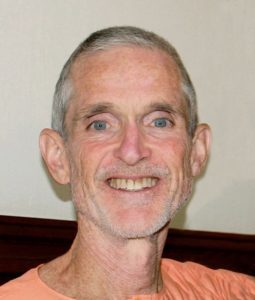By Swami Ramananda
If we pay attention to the world news, I think we can probably agree that our world is in dire need of more mindfulness, more justice and compassion. As individuals, a deeply- entrenched sense of separation, and the resulting insecurity, has given rise to so much mistrust and greed that we fail to experience the ground of being as something that we all share. This dynamic has translated into tremendous suffering and great injustice on the world stage
It’s understandable that many of us may feel powerless to bring light into the foreboding darkness that overshadows our world today. Yet the spiritual teachings of many traditions inspire us to engage in the world rather than retreat from it. Many great beings have served as role models for us, taking one step at a time, compassionately and mindfully, guided by the deeper understanding of our interdependence.
One of the ways a group of us have decided to focus our energies in this direction is the practice of compassionate communication. Communicating with a priority of genuine care for the well-being of the person we’re interacting with is a way of bringing spiritual values to the forefront of our daily lives.
We were inspired by a recent Satsang offered by Reverend Kamala Itzel Hayward, who offered a number of concrete steps that we feel can open the doors to deep listening, and problem-solving with open hearts. Here are a few of the principles that we are practicing, some of which come directly from Marshall Rosenberg‘s teachings on Nonviolent Communication.
The first principle is to observe the tendency to interpret what is actually said. There is often a strong tendency to interpret communications by using assumptions based on our personal history. For example, we may find ourselves concluding that someone dislikes us when they give us critical feedback. In reality, such remarks may be a way of showing care and a genuine desire for us to grow. We need to be able to see this tendency to interpret and to separate it from what was actually said.
The second principle concerns disagreements. There can be a great benefit to reflecting on the needs of the person we’re disagreeing with. Instead of just focusing on someone’s outward actions, it might make a considerable difference if we can shift our attention to curiosity about the needs behind their point of view. We may possibly defuse a charged conversation by making clear our intention to understand their view in a deeper way and it might also open their minds to hearing about our own needs and perspectives
Third, we are unlikely to succeed if we approach a disagreement dead set on changing someone or showing them where they are wrong. If we can show a genuine concern and respect for the other person’s perspective, our dialogue is much more likely to find common ground.
Rev Kamala told us about a friend of hers who had a potentially charged argument with someone who was in support of building a wall at the US-Mexican border. When Kamala‘s friend asked with compassion and curiosity about the need that this person had behind their support of the wall, the conversation shifted and the two found common ground in the basic need of wanting to protect their families.
Once we can understand the need behind someone’s assertions, we are capable of relating to them from the heart instead of simply judging their point of view. We may be able to dialogue instead about alternative ways to fulfill that need instead of simply making ourselves right and someone else wrong.
If you’re like me, it sounds much simpler and safer to simply avoid conflict and difficult conversations. But doing so may also mean compromising our commitment to practicing ahimsa (non-violence) and satya (truthfulness), as well as the intention to stand up for social justice.
Bringing compassion into a dialogue over polarized points of view has proven to be very powerful, especially when we look at the non-violent activism of Mahatma Gandhi, Martin Luther King Jr. and Thich Nhat Hanh. We can all make an effort to embark upon a pathway of mindful and open communication rather than judging someone’s point of view without understanding what’s behind it.
Can you imagine saying to someone something like, “I view this a little differently than you. I’d like to hear more about what your thinking and if you’re open to it, tell you more about my perspective.” Along with this kind of effort, it’s equally important that we have compassion for ourselves and discern when we are ready to engage in a difficult conversation or when we may be too upset to speak skillfully.
Compassionate communication is supported and enhanced by a regular meditative practice that brings clarity and equanimity to the mind. A committed practice will gradually enable us to disengage from the ways we define ourselves as separate, thus clinging to narrow perspectives. As we quiet the habitual thoughts that cloud our vision, we begin to experience a Spiritual Presence at the core of our being and a natural flow of compassion for ourselves and each other.

And his upcoming workshop Transforming Anger and Fear -Yoga’s Practical Wisdom Thu. May 5 @ 5:30 pm – 7:00 pm PT.
Swami Ramananda is the Executive Director of the Integral Yoga Institute in San Francisco and a greatly respected senior teacher in the Integral Yoga tradition, who has been practicing Yoga for over 45 years. Ramananda offers practical methods of integrating the timeless teachings and practices of Yoga into daily life, and transforming the painful aspects of human experience into steps toward realizing one’s full potential.
He leads beginner, intermediate and advanced level Yoga teacher training programs in San Francisco, and offers a variety of programs in many locations in the U.S., Europe and South America. Ramananda co-developed the Stress Management Teacher Training program with Swami Vidyananda, has trained many teachers to bring Yoga into corporate, hospital and medical settings, and has taught mind/body wellness programs in many locations. He is a certified Yoga therapist and founding board member of the Yoga Alliance, a national registry that supports and promotes yoga teachers as professionals. He is a co-founder of The Spiritual Action Initiative (SAI) which brings together individuals committed to working for social justice for all beings and for the care and healing of our natural world. His warmth, wisdom and sense of humor have endeared him to many.

